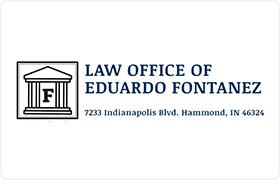Hobart Juvenile Law Lawyer, Indiana
Sponsored Law Firm
-
 x
x

Click For More Info:
-
Law Office of Eduardo Fontanez
7233 Indianapolis Blvd Hammond, IN 46324» view mapCriminal Defense, Divorce & Family Law Former Judge & Former Deputy Prosecutor
I hope we can resolve any issue you may need. Here at the Law Office of Eduardo Fontanez, are focused on providing high-quality service and customer satisfaction.
800-697-7560
Wendell Watts Goad
Juvenile Law, Government, Divorce & Family Law
Status: In Good Standing Licensed: 44 Years
Reva Jeanne Hill
Juvenile Law, Pension & Benefits, Divorce, Divorce & Family Law
Status: In Good Standing
Paul Anthony Leonard
Employee Rights, Divorce, Divorce & Family Law, Juvenile Law
Status: In Good Standing Licensed: 42 Years
Joanne Kathryn Eldred
Litigation, Trusts, Family Law, Juvenile Law
Status: In Good Standing Licensed: 31 Years
Martell Blake Royer
Family Law, Divorce & Family Law, Juvenile Law
Status: In Good Standing Licensed: 55 Years
 Eduardo Fontanez Hammond, IN
Eduardo Fontanez Hammond, IN Practice AreasExpertise
Practice AreasExpertise
